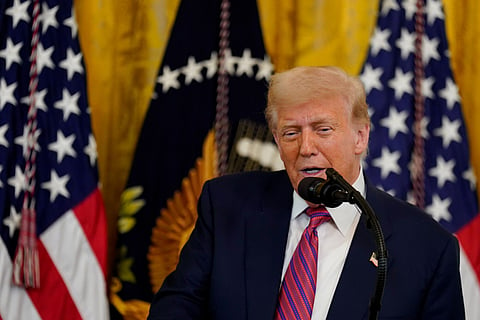Trump signs stablecoin bill, delivering win for crypto industry
The Genius Act sets regulatory rules for US dollar-backed stablecoins

President Donald Trump signed the first federal bill to regulate stablecoins, hailing it as a “giant step to cement American dominance of global finance and crypto technology” and delivering a major victory for the digital asset industry.
“The Genius Act creates a clear and simple regulatory framework to establish and unleash the immense promise of dollar-backed stablecoins,” Trump said Friday at a White House ceremony. “This could be perhaps the greatest revolution in financial technology since the birth of the internet itself.”
The measure sets regulatory rules for US dollar-backed stablecoins, including a requirement for firms to hold dollar-for-dollar reserves in short-term government debt or similar products overseen by state or federal regulators. Advocates see it as allowing for the broader adoption of digital assets in finance.
Senior Treasury officials who briefed reporters on the bill earlier Friday on condition of anonymity said it would provide more certainty to stablecoin issuers, allow for innovation in and adoption of digital assets and help extend the dominance of the US dollar. They said it would provide issuers with strict requirements for backing stablecoins with cash or short-term Treasury debt.
Trump said the measure would “secure the dollar’s status as the world’s reserve currency,” adding that losing that position would be “like losing a world war.”
“With the privacy, flexibility and decentralization of cash, this revolution has the potential to supercharge American economic growth and empower billions of people to save and transfer in US dollars,” he said.
The passage marks a political turnaround for a nascent industry that Trump once treated with skepticism but grew to champion. The legislation was the center of a push that the president touted as “Crypto Week.”
Trump was joined by tech and crypto executives, including Brian Armstrong of Coinbase Global Inc., Vlad Tenev of Robinhood Markets Inc., Cameron and Tyler Winklevoss, the billionaire twins behind the Gemini exchange, and Rumble Inc.’s Chris Pavlovski.
“This signing is a massive validation of your hard work and your pioneering spirit and your ability to never give up,” Trump told the crypto executives.
Once scarred by the stunning collapse of Sam Bankman-Fried’s FTX crypto exchange, proponents of the newly-signed law say the industry will now enjoy a predictable regulatory environment and legitimacy for the asset class.
The legislation passed the House with broad bipartisan support after a months-long effort that was almost waylaid by conservative lawmakers who held up the bill and demanded a provision prohibiting the Federal Reserve from issuing digital currency. The hardliners met with Trump at the White House, ultimately dropping their blockade after House leadership assured them that a measure addressing central bank digital assets would be added to a defense authorization package later this year.
Democrats unsuccessfully tried to add a provision to the bill that would bar elected officials and their families from stablecoin ventures. That measure threatened to impact Trump and his family, who have ties to digital-asset businesses including World Liberty Financial, a platform with its own branded token and stablecoin. Some Democratic critics warned that the legislation does not do enough to protect consumers and could lead to pressure for government bailouts if digital tokens fail.
The bill’s adoption marks the ascendancy of crypto investors and executives as a political force, following their use of well-funded political action committees in the 2024 election to back candidates friendly to their industry. Trump on the trail enjoyed strong support from the crypto industry.
Explainer: How Trump Came Around to Crypto—and What Crypto Wants in Return
Trump tapped venture capitalist David Sacks of Craft Ventures LLC to be the first-ever White House artificial intelligence and crypto czar.
The president hosted industry leaders at the White House in March and signed an executive order calling for the creation of a Strategic Bitcoin Reserve and a separate stockpile of other digital assets. His administration has also vowed to elevate crypto-friendly regulators and dismissed or paused lawsuits and investigations whose targets included Coinbase, Robinhood, Uniswap Labs and OpenSea.
“I got you guys out of so much trouble,” Trump told the executives gathered at Friday’s ceremony.
More stories like this are available on bloomberg.com
Gulf News English Text RSS April 2024
©2025 Bloomberg L.P.
Sign up for the Daily Briefing
Get the latest news and updates straight to your inbox


